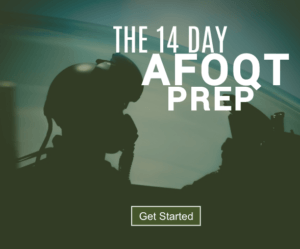Purpose
The underlying purpose of the AFOQT Work Knowledge section is to assess your general understanding of words and numerous definitions.
Concept
With the multitude of selective words, you will have to choose the closest meaning as the right answer. In essence, it tests your ability to conceptualize the words, verbal comprehension, and infer written material altogether. Also, in order to master hundreds or perhaps even thousands of words – it would be wise to get familiar with roots, suffixes, prefixes. In fact, this method is used by a significant portion of students to prepare for the test.
Understanding AFOQT Word Knowledge
The AFOQT (Air Force Officer Qualifying Test) Word Knowledge section assesses your ability to understand and work with vocabulary, which is essential for effective communication in various Air Force roles. A strong performance in this section is crucial, as it contributes to your overall AFOQT score and your qualification for certain military jobs.
Key Vocabulary for AFOQT Word Knowledge
To do well in the AFOQT Word Knowledge section, it’s important to focus on expanding your vocabulary and understanding how words are used in different contexts. Here are some tips:
Study Root Words: Understanding the root of a word can help you decipher its meaning, even if you’ve never seen the word before. For example, the root “bene” means “good,” so words like “beneficial” or “benevolent” have positive connotations.
Learn Common Prefixes and Suffixes: Prefixes and suffixes can alter the meaning of a word significantly. For instance, the prefix “un-” typically means “not,” as in “unhappy,” meaning “not happy.”
Practice Synonyms and Antonyms: Knowing the synonyms and antonyms of words can help you recognize correct answers more easily. For example, knowing that “happy” is synonymous with “joyful” and antonymous with “sad” can guide you in multiple-choice questions.
Use Vocabulary in Context: The AFOQT often tests vocabulary in context. Practice using new words in sentences to better understand their meanings and how they are used.
How to Prepare for the AFOQT Word Knowledge Section
Preparation is key to excelling in the AFOQT Word Knowledge section. Here are some strategies to help you get ready:
Daily Vocabulary Practice: Make it a habit to learn new words daily. Use flashcards, apps, or word lists to keep track of your progress.
Read Widely: Reading books, articles, and other written material can expose you to new vocabulary and help you see how words are used in different contexts.
Take Practice Tests: Practice tests can help you get familiar with the types of questions you’ll face and identify areas where you need to improve.
Review Commonly Tested Words: Some words are more likely to appear on the test than others. Reviewing lists of commonly tested words can give you an edge.
Common Pitfalls in AFOQT Word Knowledge
Even well-prepared candidates can make mistakes in this section if they’re not careful. Here are some common pitfalls to avoid:
Confusing Similar Words: Be careful not to confuse words that look or sound similar but have different meanings, such as “affect” and “effect.”
Overlooking Context Clues: Always use the context provided in the question to help you determine the meaning of a word. Ignoring these clues can lead to incorrect answers.
Neglecting Word Forms: Pay attention to different forms of words, such as nouns, verbs, adjectives, and adverbs. Understanding how a word’s form affects its meaning can be crucial for answering questions correctly.
Frequently Asked Questions about AFOQT Word Knowledge
Q: How many questions are in the AFOQT Word Knowledge section?
A: The AFOQT Word Knowledge section typically consists of 25 questions that must be answered within a set time limit.
Q: What types of words are tested in this section?
A: The AFOQT Word Knowledge section tests a wide range of vocabulary, including commonly used words, military-specific terms, and more advanced vocabulary.
Q: How can I improve my vocabulary for this section?
A: Consistent practice, reading widely, and using flashcards or apps to learn new words are effective strategies for improving your vocabulary.
Need help preparing for your AFOQT?

Top Strategies for AFOQT Reading Comprehension | Study Now
Purpose The sole purpose of this subsection is to test your capacity to read, process, and understand small or extensive write material. Concept The

Understanding AFOQT Word Knowledge | Complete Vocabulary Guide
Purpose The underlying purpose of the AFOQT Work Knowledge section is to assess your general understanding of words and numerous

Boost Your AFOQT Math Knowledge Score | Expert Math Tips
Purpose The Math Knowledge section taps on cadets’ willingness to expand on fundamental arithmetic concepts. It means preparing beyond just

Understanding AFOQT Arithmetic Reasoning | Complete Math Guide
Purpose Arithmetic Reasoning essentially measures cadets’ capacity to solve from simple to complex problems. Applicants will have to decide the

AFOQT Verbal Analogies: Strategies and Tips for High Scores
Purpose This part of the test measures your capacity to form a relationship between words. While it may sound straightforward,






